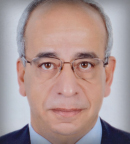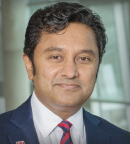In this installment of The ASCO Post’s Global Oncology series, Guest Editor Chandrakanth Are, MBBS, MBA, FRCS, FACS, spoke with Ashraf Zaghloul, MD, DrPH, Professor at the National Cancer Institute of Egypt and President of the Egyptian Society of Surgical Oncology.
Dr. Zaghloul was born in 1956 in Cairo, one of the world’s most cosmopolitan cities. Dr. Zaghloul was reared in a middle-class family that emphasized high-quality education. To that end, his elder brother earned a PhD at Harvard University, and his younger sister went to the University of Arizona, also earning a PhD. Dr. Zaghloul chose to remain in Egypt to pursue his dream of becoming a physician, attending the internationally renowned Kasr Al Ainy School of Medicine in Cairo, which was established in 1826, the oldest medical school in the Middle East.

Ashraf Zaghloul, MD, DrPH
“After attaining my medical degree, I stayed on at Kasr Al Ainy to receive my master’s degree in general surgery. I was attracted to surgery because of the immediate sense of accomplishment in the operating room,” said Dr. Zaghloul.
Intrigued by the challenges of oncologic surgery, Dr. Zaghloul started working at the National Cancer Institute (NCI) of Cairo, where he had the good fortune to be mentored by one of the Institute’s cofounders, Prof. Ismail El Sebai, who introduced radical cancer surgery in Egypt and trained a large number of Egyptian surgeons.
“Dr. El Sebai was an incredible mentor, who taught me a true appreciation of the art of oncologic surgery. Being at the NCI was a valuable learning experience, although it took me about 10 years to attain my PhD. I ran into several obstacles on the road to my doctoral degree. For one, I changed my thesis a couple of times, which certainly added complexity to the already complex process. I ended up doing my thesis on gastric pull-up reconstruction after esophageal cancer, which is an interesting procedure following total circumferential pharyngolaryngectomy,” said Dr. Zaghloul.
Seeking Leadership Roles
Dr. Zaghloul’s career in surgical oncology rapidly blossomed into a leadership role in Egyptian oncology. He is currently President of the Egyptian Society of Surgical Oncology, which was founded in 2000 by members of the NCI of Egypt. Egypt, which is situated on the northeast corner of Africa, has a population of about 102 million. Cancer is the nation’s second leading cause of death, after cardiovascular disease. The most common cancer in Egyptian women is breast cancer; in men, it is liver cancer.
When asked about this high incidence of liver cancer in men, Dr. Zaghloul replied: “Viral hepatitis is one of Egypt’s most significant public health challenges, affecting an estimated 8 to 10 million persons, or 10% of the population, living with the disease and millions more at risk for infection. In fact, Egypt has the highest prevalence of hepatitis C virus in the world, largely as a result of the prevalence of schistosomiasis and its mass treatment in the 1950s and 1960s by unsafe intravenous injections.”
I was attracted to surgery because of the immediate sense of accomplishment in the operating room.— Ashraf Zaghloul, MD, DrPH
Tweet this quote
In 1992, Egypt started a program of universal immunization in infancy in accordance with World Health Organization (WHO) recommendations. The schedule adopted by the Egyptian Ministry of Health was three doses of yeast-recombinant hepatitis B vaccine administered to all infants at age 2, 4, and 6 months to coincide with other compulsory vaccines.
“Over the past decades, we set a model for how to eradicate hepatitis C around the world. We treated more than 2.5 million patients with hepatitis C. And in Egypt, we have a resounding public health example of that, thanks largely to our government’s ongoing initiatives,” said Dr. Zaghloul.
Major Public Health Victory
Further demonstrating Egypt’s proactive public health policy was the successful control of schistosomiasis, which changed the epidemiology of bladder cancer in Egypt. Dr. Zaghloul pointed out that schistosomiasis is a parasitic disease caused by flatworms that live in snail-infested fresh water. The association between squamous cell carcinoma of the bladder and schistosomal bladder infection is well known to most physicians. However, less recognized is the significant cause-and-effect connection between the eradication of schistosomiasis and the subsequent profound decline in squamous cell bladder cancer.
“Public health initiatives in Egypt have effectively eliminated the most common cause of death in young Egyptian men, and the result is a testament to how basic science, properly applied to public policy, can dramatically improve the health of an entire country,” said Dr. Zaghloul.
Asked to describe Egypt’s cancer burden within the context of North Africa, Dr. Zaghloul noted that Egypt is the most populated country in the region, which it shares with seven other nations: Morocco, Algeria, Tunisia, Libya, Somalia, Djibouti, and Sudan. “Perhaps the biggest thing that separates Egypt from the other nations of North Africa is that it is the only country with a national cancer registry, which was developed about 10 years ago. We launched the first comprehensive national cancer center in Egypt in 1969, and from this institute, we graduated a lot of African, as well as North African, doctors and technicians.”
Dr. Zaghloul continued: “We established the Children’s Cancer Hospital, Egypt (CCHE), which is a charity hospital that started serving the pediatric oncology community on July 7, 2007. The hospital’s aim is to manage children with cancer in a professional manner according to international standards. The first CCHE scientific conference was held in July 2009, and 41 international speakers were invited, together with 12 speakers from CCHE,” said Dr. Zaghloul.
GUEST EDITOR

Chandrakanth Are, MBBS, MBA, FRCS, FACS
“We currently have more than 16 specialized cancer centers across Egypt. After 30 years of creating capacity for treatment and training in pathology, radiation, and surgical and medical oncology, we have more than 350 practitioners who have attained their medical degrees. And, these clinicians have adopted the international standards for treating cancer. Therefore, I do believe Egypt has the most advanced management of cancer in the region, which is in line with the highly specialized centers in the developed world.”
Caravan of Hope
Dr. Are asked, given Egypt’s public cancer care advances, whether Egyptian clinicians are active in other parts of the region. “Absolutely. We actually sent cancer care convoys to other African countries. I have been on these outreach programs in Kenya, Ethiopia, and Sudan. After we help them upgrade their care system, we have meetings with local medical authorities, and we open channels for our consultation intervention, if they have difficult cases. Our cancer care in Egypt is essentially provided free by the government, and we offer the same level of care for free to poorer countries in sub-Saharan Africa. A lot of cases are transferred to Egypt from countries in the southern regions,” said Dr. Zaghloul.
Cost Containment
Dr. Zaghloul explained that infectious disease remains the highest burden on health care in sub-Saharan Africa. “There’s a lot of oncogenic viral infection, such as Epstein-Barr virus, which causes Burkitt lymphoma, human papillomavirus, and cervical carcinoma. There is a large prevalence of human immunodeficiency virus–driven Kaposi sarcoma. Moreover, sub-Saharan Africa has disproportionately high mortality rates from cancer compared to other countries in the developing world. This is largely due to the deficiency of highly specialized centers for cancers. The United Nations, WHO, and other organizations are collaborating on strategies to help resolve these inequities of cancer care. In regions like this, however, there are so many other issues that it is a monumental effort—but one that is necessary for global health,” said Dr. Zaghloul.
According to Dr. Zaghloul, the most crucial challenge that the global oncology community faces is mitigating the untenable costs in the delivery of cancer care. “We are facing a looming crisis as the world’s cancer burden continues to increase. Donations from foundations and nongovernmental organizations can cover some of the existing needs, but they will fall far short of our projected needs in the future. We have a huge shortage of screening and prevention programs in mid- and low-level–income nations, which in turn will impact the overall global epidemic of cancer. In Egypt, the government has made wise public health policies that have made cancer care available to everyone, regardless of economic status. Developing similar strategies on the global scale will require collaboration and dedication from leading health organizations and the private philanthropic sector,” said Dr. Zaghloul.
In 2011, Dr. Zaghloul introduced robotic surgery in Egypt, with the first robotic unit in all of Africa. “During the past 10 years, we established a good program in urologic, colorectal, and gynecologic robotic surgery. However, at a certain point, we had to lessen the case load because the cost per case is tremendous. So, the cost of an intervention can prevent patients from accessing the good quality of service such a procedure provides. Robotic surgery, to me, is the perfect example of cost-prohibitive care that must be addressed. The lack of access is health-care discrimination at the basic level, because the right to be treated should be a basic right of any human being,” said Dr. Zaghloul.
Robotic surgery, to me, is the perfect example of cost-prohibitive care that must be addressed. The lack of access is health-care discrimination at the basic level…— Ashraf Zaghloul, MD, DrPH
Tweet this quote
More Research Funding Needed
Dr. Zaghloul stressed that progress in cancer treatment moves in step with research efforts in the lab and the clinical trial system. He said that the nation’s Ministry of Higher Education and Research offers the Egyptian equivalent of $1 billion per year for research efforts, which is not enough, as it covers efforts in all types of cancers.
“Therefore, we rely on [nongovernmental organizations] and other groups to supplement research funding. We also have developed the Egyptian Cancer Research Network, which provides links between the various cancer research professionals in the country. These links facilitate the design and implementation of research studies in cancer by enabling researchers to identify and locate resources and expertise that may not be available to them at their own institutions, and hence plan collaborative work that may not be possible for a single institution separately,” said Dr. Zaghloul.
Dealing With COVID-19
Asked how the COVID-19 pandemic affected the delivery of cancer care services, Dr. Zaghloul responded: “It affected us dramatically, especially in the beginning, when we weren’t prepared. We had our first case in February 2020, and soon after, we went into lockdown, which decreased our case load by 35%, limiting services on a critical-need basis. In short, I must say that the extensive measures we used to prevent or limit the exposure of patients with cancer to COVID-19 and to provide cancer treatment to patients in need as safely and as correctly as possible were a success. Moreover, we learned a lot about ourselves as cancer care providers, much of which made us better at what we do,” said Dr. Zaghloul.
Closing Thoughts
Dr. Zaghloul stressed that although the challenges ahead in combating the rising global cancer burden are daunting, they become less so if we dissolve the barriers between us and collaborate internationally.
“We have to come together as a global community and address honestly the biggest barrier to care in low-resource countries: access to affordable cancer care,” he said. “If we address rising costs, it will make the next steps toward equitable care easier. We must work diligently to ensure that everyone on earth, regardless of socioeconomic status, has access to high-value cancer care. That is my dream that I hope every one of my colleagues shares.”
DISCLOSURE: Dr. Zaghloul reported no conflicts of interest.

